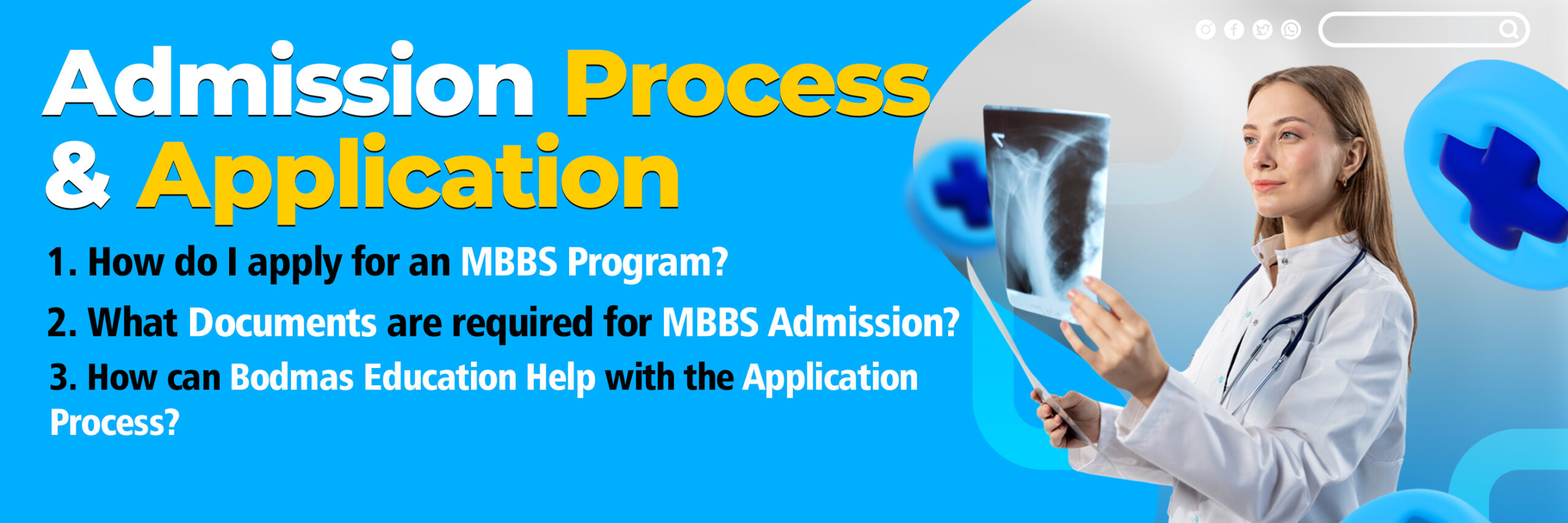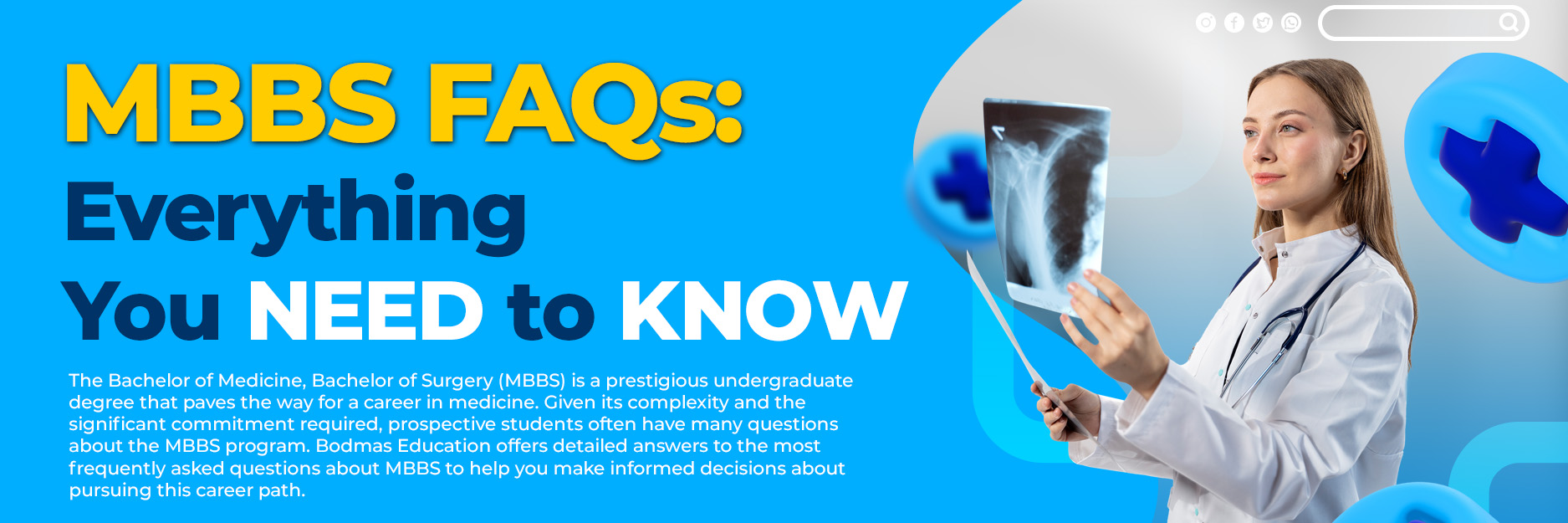MBBS FAQs: Everything You Need to Know
MBBS FAQs: Everything You Need to Know
The Bachelor of Medicine, Bachelor of Surgery (MBBS) is a prestigious undergraduate degree that paves the way for a career in medicine. Given its complexity and the significant commitment required, prospective students often have many questions about the MBBS program. Bodmas Education offers detailed answers to the most frequently asked questions about MBBS to help you make informed decisions about pursuing this career path.
What is MBBS?
Q1: What does MBBS stand for?
A1: MBBS stands for “Bachelor of Medicine, Bachelor of Surgery.” It is a globally recognized undergraduate degree for medical students that combines theoretical and practical training in various aspects of medicine and surgery.
Q2: What is the duration of the MBBS program?
A2: The MBBS program typically lasts five to six years, depending on the country and institution. This includes a period of clinical training and internships, where students gain hands-on experience in hospitals and clinics.
Eligibility and Admission
Q3: What are the eligibility criteria for MBBS admission?
A3: Eligibility criteria for MBBS programs generally include:
- Educational Qualifications: Completion of higher secondary education (10+2) with a focus on Physics, Chemistry, and Biology, and a minimum percentage (usually between 50% to 60%).
- Entrance Exams: Most institutions require candidates to pass a medical entrance exam, such as NEET (National Eligibility cum Entrance Test) in India, MCAT (Medical College Admission Test) in the US, or BMAT (Biomedical Admissions Test) in the UK.
Q4: Are there entrance exams for MBBS admission?
A4: Yes, entrance exams are a crucial part of the admission process for MBBS programs. Some common entrance exams include:
- NEET (National Eligibility cum Entrance Test): For admission to medical colleges in India.
- MCAT (Medical College Admission Test): For medical schools in the United States.
- BMAT (Biomedical Admissions Test): For medical schools in the United Kingdom.
- Other Country-Specific Exams: Various countries have their own entrance tests for medical admissions.
Q5: How can Bodmas Education assist with MBBS admissions?
A5: Bodmas Education provides comprehensive support for MBBS admissions, including:
- Counseling: Personalized guidance on choosing the right medical college and program.
- Entrance Exam Preparation: Coaching and resources to prepare for medical entrance exams.
- Application Assistance: Help with filling out application forms, preparing for interviews, and meeting deadlines.
Curriculum and Course Structure
Q6: What subjects are covered in the MBBS curriculum?
A6: The MBBS curriculum includes a wide range of subjects:
- Basic Sciences: Anatomy, Physiology, Biochemistry, and Pathology.
- Clinical Sciences: Internal Medicine, Surgery, Obstetrics and Gynecology, Pediatrics, Psychiatry, and Dermatology.
- Pre-Clinical Training: Involves learning basic medical sciences and their applications.
- Clinical Training: Hands-on training in hospitals and clinics, including patient care and medical procedures.
Q7: Are there practical components in the MBBS course?
A7: Yes, practical components are integral to the MBBS program:
- Clinical Rotations: Students rotate through different departments (e.g., Medicine, Surgery) to gain practical experience.
- Internships: Final-year students typically complete internships in hospitals, where they practice under supervision.
- Practical Labs: Courses include laboratory work to understand diagnostic techniques and medical research.
Career Opportunities
Q8: What career options are available after completing an MBBS degree?
A8: An MBBS degree opens up various career paths in the medical field:
- Clinical Practice: Working as a General Practitioner (GP) or a specialist in hospitals or private practice.
- Hospital Administration: Managing hospital operations and healthcare services.
- Public Health: Working with government agencies or NGOs in health promotion and disease prevention.
- Medical Research: Conducting research in medical sciences and contributing to advancements in healthcare.
- Teaching and Academia: Educating future medical students and conducting research in medical institutions.
Q9: Can I pursue further studies after completing MBBS?
A9: Yes, many MBBS graduates pursue further studies to specialize in specific areas of medicine:
- Postgraduate Degrees: MD (Doctor of Medicine), MS (Master of Surgery), or other specialized medical degrees.
- Fellowships: Advanced training in a particular medical field.
- Diplomas and Certifications: In areas such as dermatology, cardiology, or emergency medicine.
Financial Aspects
Q10: What is the fee structure for MBBS programs?
A10: Fees for MBBS programs can vary significantly depending on the institution and country:
- Government Medical Colleges: Typically have lower fees, ranging from INR 50,000 to INR 2 lakhs per year in India.
- Private Medical Colleges: Fees can range from INR 5 lakhs to INR 20 lakhs per year.
- International Institutions: Fees can be higher, often ranging from USD 20,000 to USD 60,000 per year.
Q11: Are there scholarships or financial aid options available for MBBS students?
A11: Yes, many scholarships and financial aid options are available:
- University Scholarships: Based on academic performance or financial need.
- Government Scholarships: Provided by various governments for eligible students.
- Education Loans: Offered by banks and financial institutions to cover tuition fees and other expenses.
Q12: How can Bodmas Education assist with financial planning?
A12: Bodmas Education helps with:
- Scholarship Guidance: Identifying and applying for scholarships and financial aid.
- Education Loans: Assisting with the application process for education loans and managing financial aspects of medical education.
Admission Process and Application
Q13: How do I apply for an MBBS program?
A13: The application process for MBBS typically involves:
- Researching Institutions: Identifying universities and medical schools offering MBBS programs.
- Registering for Entrance Exams: Preparing for and registering for required medical entrance exams.
- Filling Out Application Forms: Completing online or offline applications with academic and personal details.
- Paying Application Fees: As required by the medical school or entrance exam.
Q14: What documents are required for MBBS admission?
A14: Commonly required documents include:
- Educational Certificates: Mark sheets of previous examinations, including 10+2.
- Entrance Exam Scorecards: If applicable.
- Personal Identification: Such as a government-issued ID or passport.
- Photographs: Recent passport-sized photographs.
- Medical Certificates: Proof of health and fitness.

Q15: How can Bodmas Education help with the application process?
A15: Bodmas Education provides:
- Application Assistance: Guidance in completing and submitting application forms.
- Document Preparation: Help with gathering and organizing required documents.
- Deadline Management: Ensuring all deadlines are met for applications and entrance exams.
International Perspective
Q16: Can I pursue MBBS abroad?
A16: Yes, many countries offer MBBS programs. Studying abroad can provide exposure to different medical systems and practices:
- United States: Offers the MD (Doctor of Medicine) program, equivalent to MBBS in other countries.
- United Kingdom: Offers MBBS programs with a focus on clinical and theoretical training.
- China and Russia: Known for affordable MBBS programs with English-medium instruction.
Q17: What are the benefits of studying MBBS abroad?
A17: Benefits include:
- Global Exposure: Understanding diverse medical practices and healthcare systems.
- International Networking: Building connections with medical professionals worldwide.
- Enhanced Career Prospects: Gaining qualifications that are recognized globally.
Q18: How can Bodmas Education assist with studying MBBS abroad?
A18: Bodmas Education offers:
- University Selection: Helping you choose the best medical schools based on your preferences and budget.
- Application Guidance: Assisting with international application processes.
- Visa and Accommodation Support: Providing information and assistance with visa applications and accommodation arrangements.
MBBS Degree
The MBBS degree is a gateway to a rewarding and impactful career in medicine. With its rigorous curriculum, extensive practical training, and numerous career opportunities, it requires careful planning and preparation. Understanding key aspects of the MBBS program, including eligibility, curriculum, career prospects, and financial planning, is crucial for making informed decisions.
Bodmas Education is dedicated to helping you navigate the complexities of pursuing an MBBS degree. From providing expert guidance on admissions to assisting with financial planning and studying abroad, our team is here to support you every step of the way.
For personalized assistance and detailed guidance on pursuing an MBBS degree, contact Bodmas Education. Our dedicated consultants are committed to helping you achieve your academic and professional goals in the medical field.






















